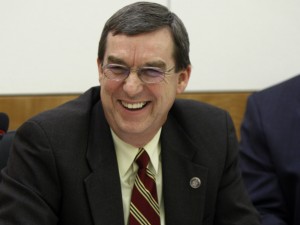 Former Senator Phil Puckett’s resignation that flipped the Virginia Senate majority to the GOP, thus sparking the #BLACKorBUST anti-Medicaid amendments, has now reportedly drawn scrutiny from federal investigators.
Former Senator Phil Puckett’s resignation that flipped the Virginia Senate majority to the GOP, thus sparking the #BLACKorBUST anti-Medicaid amendments, has now reportedly drawn scrutiny from federal investigators.
At the time of his resignation, it was widely reported that Puckett did so as part of a deal to allow his daughter to become a Virginia judge, and to accept a paid position on the state’s tobacco commission. Puckett subsequently distanced himself from any commitment for a job, saying in a statement issued at the time, “I have never been officially offered a job by the Tobacco Commission.”
The Times-Dispatch broke the story, and has full details here.
Although the headlines all say “Puckett,” there may also be real danger for Del. Terry Kilgore (R-Scott), who serves as chairman of the tobacco commission. In Virginia, the bribery law reaches both those who offer and those who accept, and as we’ve learned from examining the ongoing legal saga surrounding former Governor Bob McDonnell and his wife, a lot of these kinds of questions will depend on what constitutes an official act that can be reached by anti-corruption laws. Here’s what the Virginia bribery law says:
§ 18.2-447. When person guilty of bribery.
A person shall be guilty of bribery under the provisions of this article:
(1) If he offers, confers or agrees to confer upon another (a) any pecuniary benefit as consideration for or to obtain or influence the recipient’s decision, opinion, recommendation, vote or other exercise of discretion as a public servant or party official, or (b) any benefit as consideration for or to obtain or influence either the recipient’s decision, opinion, recommendation, vote or other exercise of official discretion in a judicial or administrative proceeding or the recipient’s violation of a known legal duty as a public servant or party official; or
(2) If he accepts or agrees to accept from another (a) any pecuniary benefit offered, conferred or agreed to be conferred as consideration for or to obtain or influence the recipient’s decision, opinion, recommendation, vote or other exercise of discretion as a public servant or party official, or (b) any benefit offered, conferred or agreed to be conferred as consideration for or to obtain or influence either the recipient’s decision, opinion, recommendation, vote or other exercise of official discretion in a judicial or administrative proceeding or the recipient’s violation of a known legal duty as a public servant or party official; or
(3) If he solicits from another (a) any pecuniary benefit or promise of pecuniary benefit as consideration for or in exchange for his decision, opinion, recommendation, vote or other exercise of discretion as a public servant or party official, or (b) any benefit or promise of benefit as consideration for or in exchange for his decision, opinion, recommendation, vote or other exercise of official discretion in a judicial or administrative proceeding or his violation of a known legal duty as a public servant or party official.”
Puckett is apparently accused of simply resigning from the Senate (i.e., stopping any official acts), and obviously he has not accepted any job with the tobacco commission. But did he “agree to accept” it? Is resigning from the Senate an “exercise of discretion as a public servant”? Did Kilgore make any promises to Puckett? Early reports sure suggested only that he had “discussed” the possibility of Puckett’s potential employment at the commission.
This story is definitely not going away anytime soon. We’ll have more as it happens.
